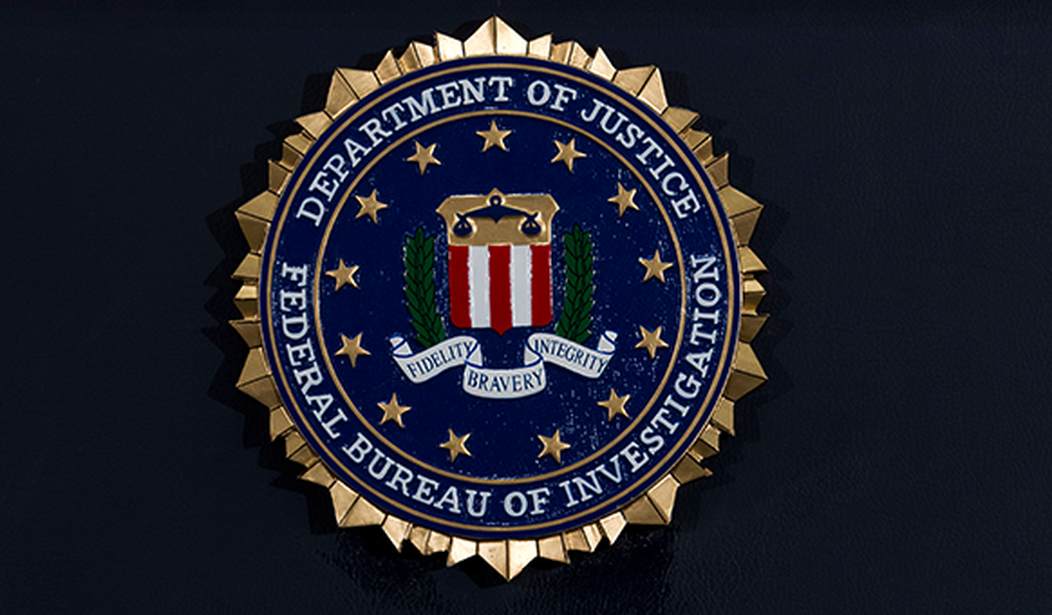If you had any doubts about whether leadership at the FBI allows political bias to shape the way the agency handles personnel decisions, you're probably safe to set those aside. It appears the bureau has been weeding out employees who hold the wrong political views — and it's not even been subtle about it.
On Saturday, Tristan Leavitt, President of Empower Oversight, "a nonpartisan, nonprofit educational organization dedicated to enhancing independent oversight of government and corporate wrongdoing," directed a letter to U.S. Department of Justice Inspector General Michael Horowitz detailing the agency's abuse of the security clearance process to force out employees with disfavored views.
🚨Empower Oversight President @tristanleavitt discloses evidence of @FBI Security Division abusing clearance reviews to probe whether FBI employees had ever:
— Empower Oversight (@EMPOWR_us) June 11, 2024
- Expressed support for President Trump, or
- Expressed opposition to the COVID-19 vaccine.https://t.co/fRZZ653eyt pic.twitter.com/vs2wB1aKXO
FBI Whistleblower Marcus Allen Vindicated: Security Clearance Reinstated, Full Back Pay Awarded
US Attorney Weiss Now Claims He Never Requested Special Prosecutor Authority in Biden Probe
The letter and its attached exhibits outline a disturbing practice employed by the agency, which led to Empower's client being forced to take early retirement. Some of the key points raised by Leavitt:
Our client served the FBI honorably for 12 years, receiving cash awards and positive performance evaluations. Then-FBI Executive Assistant Director ("EAD") Jennifer Leigh Moore suspended our client's security clearance in March 2022, which led to an indefinite suspension without pay. Shortly thereafter, our client confidentially made protected disclosures to the House Judiciary Committee, alleging politicization and abuses of the security clearance process in this case and others.
A year later, in March 2023, after Empower Oversight began representing the client, we made an additional protected disclosure on our client's behalf to you directly and to the Whistleblower Protection Coordinator at the Office of Inspector General ("OIG") about the FBI's abuse of the security clearance process. 2 That disclosure included the following:
- While on personal leave, our client was in Washington, D.C. on January 6, 2021.
- After the violence that occurred that day, our client self-reported in good faith to the appropriate FBI security official having been among the crowds in the vicinity of the Capitol, peacefully observing.
- Fifteen months later, EAD Moore suspended our client's clearance in March 2022 pending an investigation.
- The FBI Security Division ("SecD") improperly pursued a broad, sweeping investigation into our client's political opinions, questioning other protected First Amendment activity and Second Amendment advocacy while off-duty.
- Our client denied knowingly entering any restricted area of the Capitol grounds, volunteered to take an OIG polygraph examination, and was told an OIG examiner found no deception on the question of whether he knew he was entering a restricted area.
In April 2023, EAD Moore revoked our client's security clearance. Empower Oversight requested, pursuant to the FBI's internal appeal process, copies of the SecD investigative file. In January 2024, we received some (but not all) of the documents we believed necessary to draft our client's appeal.
Take a gander at the questions the FBI directed to the client's coworkers, with the warning that refusal to answer fully and truthfully could result in their own security clearances being revoked:
According to the preprinted interview outlines, SecD investigators warned our client's FBI colleagues, "You have a duty to reply to the questions posed during this interview. Should you refuse to answer or fail to reply fully and truthfully, action against your security clearance may be undertaken and you may be referred to the Inspection Division for possible disciplinary action."
After inquiring whether the interviewed individual socialized with our client, the preprinted interview outline then lists the following questions, among others, about our client's First Amendment-protected activities:
- "Vocalize support for President Trump?"
- "Vocalize objection to Covid-19 vaccination?"
- "Vocalize intent to attend 01/06/2021 ?"
As Leavitt rightly points out in the letter, holding and expressing the views included in the questionnaire is protected First Amendment activity. Interestingly, the responses to the questionnaire from his client's colleagues consistently note that while the client espoused right-leaning/conservative/pro-Trump viewpoints, he never expressed anti-government or anti-FBI rhetoric. The responses paint the picture of a guy who isn't a fan of COVID mask and vaccination mandates, is a strong Second Amendment proponent, and supports former President Donald Trump. None of which have bupkus to do with whether or not he presents a national security risk.
Leavitt also emphasizes that the initial investigation into his client was legitimate and that the FBI has valid reasons to revoke security clearances in some instances — the problem is that this wasn't one of those instances, and the methods employed by the agency to justify it belie a rot that needs to be rooted out.
Our client quickly and voluntarily self-disclosed attendance at the protest on January 6, 2021, after it descended into a riot. SecD had a legitimate reason to investigate whether our client committed any crimes, advocated any illegal acts, or did anything else that raised a legitimate security concern. The FBI also has legitimate reasons to revoke the security clearances of employees who engage in or support unlawful acts, particularly those designed to disrupt the peaceful transfer of power.
But our client did not do any of those things. Revoking a security clearance for being near those who did or merely sharing some similar political views as others who acted unlawfully is pure guilt by association.
The letter requests that the OIG investigate the matter to determine the scope of the abuses and identify those responsible, and further, to provide a report to the congressional committees charged with FBI oversight.














Join the conversation as a VIP Member